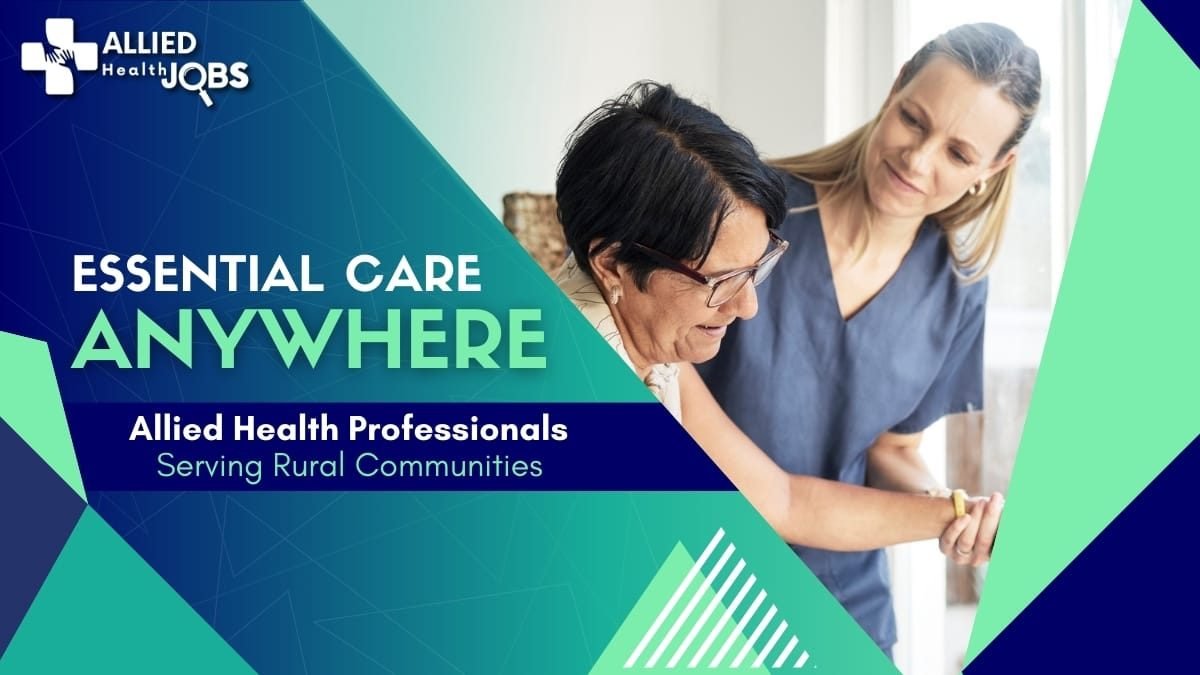Introduction
Rural communities in the U.S., are encountering a crisis shortage of health professionals, hence the allied health careers are of paramount importance. If there is limited access to medical facilities, the number of elderly people is growing and this combination proves difficult for healthcare provision in rural areas, while health professionals in allied health programs constitute the other side of the bridge to help such persons able to receive timely and effective care.
In this blog, we will discuss why allied health careers professionals are currently finding an increase in demand in rural healthcare settings and how such careers are presently shaping the future for medical services in distant areas.
An Increase in Demand for Allied Health Professionals in Rural Settings
Limited Access to Healthcare Facilities
A major challenge in rural healthcare is the distance to hospitals, clinics, and specialized medical centers. Most rural regions have a few healthcare facilities that force patients to travel long distances just to obtain medical attention. The scarcity triggers the enlistment of many allied health careers professionals, such as:
- Medical assistants who help doctors with patient care and administrative duties.
- Respiratory therapists who support patients requiring assistance with chronic conditions affecting breathing.
- Physical therapists who are responsible for assisting in rehabilitation and improvement of mobility.
allied health careers professionals in these fields make sure that the rural population receives good care closer to home and reduces hospital admissions and emergency department visits.
Aging Population and Chronic Disease Management
It is an observable fact in rural areas that they harbor more elderly than in urban centers. The elderly require specialized care throughout their life to be able to manage several chronic diseases like diabetes, heart disease, and arthritis. Allied health services provide very essential support in:
- Rehabilitative care to promote mobility and independence.
- Diagnostic and imaging services to enable early detection of health issues.
- Medication management and patient education for treatment adherence.
The aging population sets the stage for increased demand in health provision in rural areas, making allied health careers a viable and pressing workforce solution.
Shortage of Healthcare Professionals
Nationwide shortages of healthcare professionals build a brick wall for those at the rural end. Most doctors and nurses prefer to work in urban hospitals because of the advanced technology they saw inside that hospital as well as the specialized trainings offered. Thus, allied health careers professionals fill the boundary left by these hospitals within the undeveloped areas.
These health professionals create essential things such as providing interventions for the different inhabitants of their rural areas compared to their city counterparts. Examples of such roles are:
- Occupational Therapists: They train patients to regain their independence after sicknesses or accidents to perform their daily activities by improving their quality of life. Rehabilitation services are mainly unavailable at the countryside place, making it even more important for this service to be offered there.
- Speech-Language Pathologists: They work on communication disorders for both children and adults to improve their communication skills. This is extremely important for children who have developmental delays, stroke victims, and many others who have difficulty communicating.
- Imaging Technicians: These provide the very important aspect of diagnosis, which entails operating the X-ray and ultrasound machines to produce images that will later be used for diagnosis and treatment planning to enhance the formality and effectiveness of medical intervention.
These professionals indeed act in such a way that the whole shortage of health professionals in rural settings is minimized through critical roles. They give priority in keeping the health and welfare of rural people so that they would not go without some health care services. The need for assistance into the mainstreamity of any healthcare system is very much a contribution this provision.
Benefits of Allied Health Career in Rural Communities

Solid Job Security and Pay Packages
Because of a shortage of Allied Health Career professionals compared to the demand for health services in rural areas, they enjoy:
- High job stability with higher employment rates compared to urban settings.
- Competitive salaries and benefits since hospitals and clinics are using attractive benefits to lure talent.
- Prospects for career advancement through the experience gained from hands-on work and taking leadership roles.
Work-life Balance Has Improved Significantly.
Rural healthcare settings tend to offer professionals a better work-life balance such as:
- The stress level is much lower when compared with crowded urban hospitals.
- Better sense of community through interaction with patients in relationships that matter.
- Lower costs of living, with access to affordable housing and amenities.
Opportunities for Professional Growth
Rural healthcare settings give allied health professionals a variety of clinical experiences and many are cross-trained in different areas, so they:
- Broaden skill sets through clinical exposure in different medical disciplines.
- Work in collaborative health care teams, therefore, prime their leadership and problem-solving capabilities.
- Participate in telemedicine and progressive healthcare delivery models that are evolving in the rural sector.
Strategies to Attract More Allied Health Professionals to Rural Areas Addressing the Shortage
The shortfall in allied health professionals that adds to the existing problem now inciting possibilities of bring solution was through projections for pioneering guarding of attraction and retention of skilled humans. In solving this problem, approaches are often multiple in regards to education, government, and community.
Specialized training programs and Education:
Plan the specific activities by both educational institutions and health care organizations towards building a pipeline of Allied Health Career professionals for rural practice. Some include:
- Loan Repayment and Scholarship Programs: Financial incentives offered by institution or government in terms of loan repayment or scholarships for students practising in rural underserved communities decreases the economic burden of education and favourable long-term service.
- Rural Healthcare Internship Programs: Giving students immersions in field experiences in real rural health care settings. Doing this brings practical skills, a true sense of perspective of rural health care issues, and a tether to this community.
- Distance Learning and Certification Courses: Using technology to enable the individual potential candidate to study using flexible, available means. Thus, these individual candidates would not need to move to rural centers of influence, thereby building up local capacity.
- Extend allied health programs to universities and institutions specifically focusing on the needs of rural population and the specialized skills required to treat them.
Government incentivization and policy support:
Government plays a great role in making a place attractive for allied health career professions in rural areas. This is mainly through:
- Financial Incentives: Such an incentive includes tuition reimbursement, commutation cost assistance, and competitive salaries that will draw and retain qualified staff. These have been able to cushion the disadvantages as seen in rural practice.
- Grant Programs: Grant offering agricultural healthcare facilities in rural areas to train, upgrade skills, and buy needed equipment are powerful incentives for the improvement of service capacity in local facilities.
- Robust telehealth support: Good investment in telehealth infrastructure bridges a gap between the patients and specialists over distance. Telehealth enables remote consultations, patient monitoring, and access to expert advice, improving healthcare delivery in rural communities.
- Streamlining licensing processes and providing malpractice insurance assistance are also part of the policy support.
Strengthening Community Partnerships:

A strong and lasting partnership between local government entities, healthcare providers, educational institutions, and community stakeholders is essential to develop sustainable solutions. This encompasses:
- Health Outreach Programs: Such outreach programs will be held in secondary schools to raise awareness on allied health careers and their effect on the rural communities. Hence it will encourage students to think about these rewarding professions.
- Community Recruitment Initiatives: Recruitment initiatives launched by local Residents on behalf of working in rural health programs. This gives community ownership to such initiatives and strengthens local networks.
- Telemedicine Partner Systems: Introducing telemedicine providers into the health systems already in place to complement face-to-face care. This avenue guarantees that rural residents are able to access pays to fly out to consult specialist expertise.
Community advisory boards to be set up to identify and help determine priority health needs for the rural population.
By implementing these comprehensive strategies, rural communities would be able to attract and retain a workforce of highly skilled allied health career professionals, thereby seeing that all residents have equal access to quality health services.
Conclusion
The demand for allied health careers in rural communities is ever-increasing, driven by workforce shortages, aging populations, and an increasing requirement for accessible health services. Allied health careers professionals are instrumental in ensuring that rural dwellers receive quality care and help fill the gaps created by physician shortages.
Individuals looking for a gratifying healthcare career with job security, room for advancement, and the chance to affect the community would find great opportunity in the field of rural health. By furnishing education programs, financial incentives from the government, and association with the community, we can ensure that these rural areas are recipients of the quality medical care they deserve.
Stay connected on our website Allied Health Jobs to be informed about job listings and health career tips!
Follow us on Social Media: LinkedIn | Facebook | Twitter | Instagram












